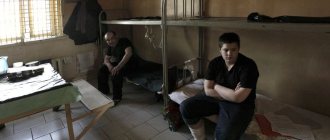How to make an application and where to submit it
This document is submitted to the head of the pre-trial detention center and its structure is as follows:
- in the upper right corner information about the applicant (full name, contact details and information about his passport) and about the recipient of the document (position, full name) is indicated;
- the name of the document itself is written in the center;
- Next, a request for a visit is formulated, indicating the degree of relationship with the prisoner, his full name and year of birth;
- At the end there is a signature and date of registration.
After you have received permission, you need to fill out an application addressed to the head of the pre-trial detention center.
The previously obtained permission must be attached to this paper and submitted to the pre-trial detention center. Do not expect to immediately get the opportunity to meet with a prisoner; as a rule, there is a waiting list for the right to receive them, which stretches for months. Therefore, you should be patient and wait until you are given such an opportunity.
In the same way, it is necessary to achieve long-term visits with the convicted person. This is exactly the procedure for granting meetings with a convicted person, but how do they take place?
What are you allowed to take with you?
You can take with you to a meeting only what is not included in the list of prohibited items. Another thing is that the guest should not have any physical contact with the prisoner . Given this, it is better not to provoke correctional officers and not to take any objects into the visiting room at all. It is better to leave your wallet, phone and bag at the checkpoint against a signature.
List of prohibited things:
- alcohol, drugs, tobacco products;
- cell phones, tablets, laptops and other means of communication;
- money and other valuables;
- Food;
- weapon.
The visitor is obliged to hand over prohibited items to the junior inspector in accordance with paragraph 76 of the extract from Order No. 295 of the Ministry of Justice of the Russian Federation. No one forbids taking printed photographs into the room for short-term visits and showing them to the prisoner. This must be done without violating the rules of the correctional institution and after warning the observer, who will probably want to inspect them.
How do visits work in a pre-trial detention center?
Be prepared that the appointment may be scheduled for the next day after you submit your application. Therefore, if the pre-trial detention center is located in one city, and you live in another, then it is better, just in case, to find a hotel where you can spend the night for a day or two.
It is better to go there together: when one is filing an application, the other can begin the transfer process.
You can learn how to complete the transfer from this article.
Please note that even if you have already been admitted to the meeting, you may have to wait another 3-4 hours before the date itself.
After passing through the gates of this institution, you will be taken to a special room where meetings are held. Usually it is divided by a glass and very durable partition into two separate spaces - one for the prisoner, and the second for visitors.
Getting into a pre-trial detention center for a visit is difficult, and many conditions must be met.
An intercom is installed for communication. It doesn't always work well, so you may hear crackling and various noises during communication.
Conversations between the accused and his relatives are monitored by prison staff. During them, an employee of the detention center will be in the room, who is obliged to check that the prisoner is not given anything prohibited for such a procedure.
Before entering the visiting area, your belongings and jacket will be searched for prohibited objects. You should not be nervous about this, but calmly undergo this procedure. In this case, cigarettes are usually broken to make sure that there is nothing else inside but tobacco, which is why it is better to buy them after checking, in a kiosk in a pre-trial detention center. By the way, you can also buy some products there if you didn’t buy them in advance.
The conditions of detention in the pre-trial detention center are described here.
If you came to the meeting with the accused along with the transfer, then it will also be checked. Therefore, it is better to prepare in advance so as not to have problems later. For example, it is better to pour all bulk substances into transparent bags in advance, since if they are in boxes, they will be opened. The same applies to liquid substances.
If you are found to have any of the prohibited items, the question may arise about the objectivity of granting you a meeting with the prisoner. These include: alcoholic beverages, any means of communication (phone, SIM cards), drugs, pornography, etc.
During a date, it is better to talk about family matters, etc.
Also, the meeting will be immediately terminated if the visitor tries to convey to the citizen under investigation any data regarding the criminal case , which may interfere with establishing the truth about it or contribute to the commission of a crime.
Another reason for the immediate end of the visit is damage to the property of the institution itself.
All of the above rules apply partially during long visits in a penal colony, but do not apply to a meeting with a defendant in a pre-trial detention center with his lawyer. In this case, the meeting takes place in a room without partitions and without the presence of institution employees.
How much: limited quantity
The number of visits depends on the conditions of serving the sentence and the type of correctional institution (read what types of correctional institutions there are and what their differences are here). The regime depends on the severity of the crime. Consequently, the more seriously the law was violated, the fewer visits the prisoner is entitled to.
Depending on various factors, both the regime and conditions of detention may change during the period. For bad behavior and offenses, the number of meetings required by law will be reduced. The first date can be scheduled immediately after arriving at the prison. However, you cannot combine several dates into one, thereby increasing its duration. You also cannot split one date into several. This rule is spelled out in Order No. 295 of the Ministry of Justice of the Russian Federation.
Conviction modes can be ordinary, light or strict. The time allotted for meeting with loved ones, the size and number of transfers also depends on this. Otherwise, there are practically no differences. Under light and strict conditions, a person lives in the same units as an ordinary prisoner and adheres to the same daily routine.
How many short-term visits is a prisoner entitled to?:
| Mode | Article | Normal conditions | Lighter conditions | Strict conditions |
| General | 121 Criminal Code of the Russian Federation | 6 | 6 | 3 |
| Strict | 123 Penal Code of the Russian Federation | 3 | 4 | 2 |
| Special | 125 Criminal Code of the Russian Federation | 2 | 3 | 2 |
The colony settlement has the most gentle conditions for convicts ; there are no restrictions on visits. This is stated in paragraph 1 of Article 129 of the Penal Code of the Russian Federation. Additional short-term dates can be obtained by exchanging long-term ones for them. This rule is spelled out in paragraph 3 of Article 89 of the Penal Code of the Russian Federation.
That is, convicts in the colony, in addition to 4 short-term ones, have the same number of long-term ones. If desired, he can exchange, for example, 2 long-term ones. Thus, the number of short-term ones will become 6 per year. It is not possible to exchange short-term for long-term. Short-term dates, in turn, can be exchanged for phone calls.
It is assumed that dates will be evenly distributed throughout the year. You can't spend everything in one month . The second and subsequent visits are granted no earlier than the expiration of the period, which is equal to: 12 months divided by the number of short-term visits allowed per year.
If a convicted person is in a general regime colony under normal conditions, then he is entitled to 4 visits per year. Divide 12 by 4, we get 3. Thus, at least 3 months should pass between the last dates.
Another reason for an unscheduled meeting is a serious illness of the convicted person, which puts his life in danger. Relatives can urgently see the prisoner; such a visit will not be counted toward the next scheduled visit.
Right to visit
According to the law, persons under investigation do have the right to visits with close relatives (Article 395 of the Code of Criminal Procedure of the Russian Federation). But to obtain the appropriate permission, a relative needs to go through a certain procedure. The permit has the right to issue:
- investigator on the case;
- a judge, if the case has already gone to trial;
- the head of the pre-trial detention center, if the court verdict has entered into force.
As a rule, requests for a visit begin to arrive immediately after the person under investigation ends up in a pre-trial detention center. Therefore, you need to contact an investigator. As for the frequency and duration of visits, it is allowed to visit a person under investigation no more than 2 times a month. The maximum duration of a meeting is 2 hours.
Info
According to the rules, meetings with the suspect are granted to a lawyer and close relatives. A fixed list of persons entitled to a meeting has not been established. Therefore, even a common-law spouse can apply for a date. But you will have to prove the running of a common household, etc. In all other cases, you also need to prove your relationship.
ECHR: lack of long visits for the accused is illegal discrimination
1. Introduction to Discrimination Theory
Discrimination is a complex topic. Proving it is an analytical challenge. I remember from a course on American constitutional law at the Central European University how American lawyers practiced in a case involving the dismissal of a woman due to pregnancy.
To discriminate, you need to find two similar people in a similar situation who were treated differently. If we are talking about discrimination against women, then we need to find a man (“male comparator”) in a similar position. Different treatment can be based on reasonable grounds, then there will be no discrimination. But the discriminator must prove them.
Finding a “male comparator” is difficult for a pregnant woman. Nature is unmerciful towards men: they are not given the opportunity to understand what it is like when a new life develops inside. Men do not carry a child, so it is impossible to find a man like a pregnant woman.
Having racked their brains quite a bit, the lawyers found a “male comparator”. It was not a pregnant man, but a man having sexual intercourse. The logic was as follows. Pregnancy is a direct consequence of sexual intercourse. But if we allow dismissal or a salary reduction due to a transfer to an easier job due to pregnancy, then it turns out that a woman who has had sexual intercourse is treated differently than a man who has had sexual intercourse.
This knight move can be criticized, but the point is clear: proving discrimination is difficult, but interesting.
2. Chaldayev v. Russia decision
This week the ECtHR published its decision Chaldayev v. Russia (No. 33172/16). The case discussed the ban on suspects and accused persons having long visits in pre-trial detention centers. In paragraph 3 of Art. 18 of the Federal Law of July 15, 1995 No. 103-FZ “On the detention of suspects and accused of committing crimes”, suspects and accused persons, on the basis of the written permission of the person or body in charge of the criminal case, may be granted no more than two visits per month with relatives and other persons for up to three hours each. During these visits, relatives are separated from the suspect by glass.
In Chaldaev’s case, the judge and the head of the pre-trial detention center refused visits without explanation. Let us note that the accused are not allowed long visits at all.
The ECHR found a violation of Article 8 (right to private life) by analogy with the case of Vlasov v. Russia and Khoroshenko v. Russia. When the ECHR considers complaints under Art. 8, he analyzes the following issues:
- was there any interference with privacy?
- was it based on law?
- Was the law of good quality, that is, was it clear and predictable?
- Was the intervention necessary in a democratic society?
In the Chaldaev case, as well as in the Khoroshenko case, the court said that the law was unclear and unpredictable. Art. 18 of the Federal Law “On Detention” gives the authorities unlimited powers: they want to deny visits, they want to grant them. Therefore, the court found a violation of Art. 8 due to the ambiguity of the law.
The Court has also repeatedly said that glass separation does not comply with the Convention, since it is applied automatically, without taking into account the danger of the prisoner or the risks to the security of the place of detention.
I expected these court findings. I did not expect a serious analysis of the arguments on discrimination (Article 14), since in previous Russian dating cases the court diplomatically avoided the issue.
Like is compared with like, remember? The court had to establish with whom to compare. Formally, suspects/accused and convicted are different groups. But the ECHR concluded that this is one group - “those deprived of liberty.” And therefore he compared the situation of the suspects/accused and those convicted.
The ECHR harshly criticized the regime of visits for convicted persons in the Khoroshenko case. The suspects' regime is even worse. Short visits for those serving sentences - 4 hours, for suspects - 3 hours. The former are entitled to long dates twice a year, but the latter do not even have this opportunity. The court concluded that the regime of visits for the accused is equivalent to the regime of visits for those sentenced to life imprisonment.
At the same time, the Russian government was unable to justify why restrictions on visits for suspects are stronger than for prisoners. Since the different treatment of such groups was not based on reasonable grounds, the court found a violation of Art. 14 European Convention (prohibition of discrimination). And he ordered Russia to pay the applicant 10 thousand in moral damages.
I will wait for the European Court’s reasoning to be accepted by the Constitutional Court. The issue of visits for the accused is long overdue.










